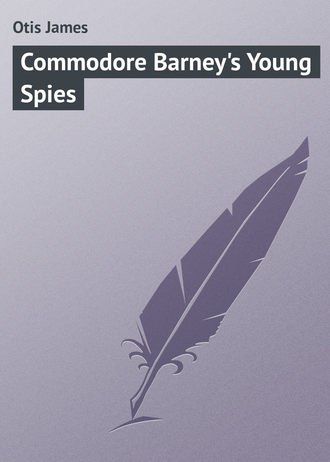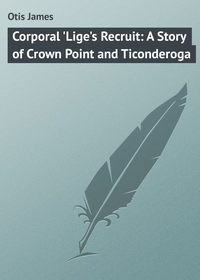 полная версия
полная версияCommodore Barney's Young Spies
I explained my reasons for asking such a question, by saying that it would be a waste of time for us to sail down the bay when the fleets were not there, because our only other market was at Annapolis or Baltimore, and he said with a laugh:
"When we're not here you can look for us further north, and we will take your oysters wherever we go."
I observed that we were on board the Narcissus, and thus understood that Darius had made no mistake when he gave that name to the ship, therefore my admiration for the old man's knowledge of nautical matters increased, for only an experienced seaman could have thus recognized a craft he had seen but once before.
By setting down so much when our business was concluded, it would appear as if we loafed on the deck of the ship some time, whereas we were given to understand that our room was better than our company immediately the transaction was completed, and in a very few seconds after the officers allowed Jerry and I to cease the labor of shucking, we were aboard the Avenger, getting under way.
"Look at the name they've given that old bargee!" one of the gentlemen on the quarter-deck cried with a laugh as the pungy swung around until the letters on her stern could be read. "These Americans may be hot for vengeance; but I take notice that they're ready to feed the enemy if there's a dollar to be made."
All this seemed very funny to the Britishers, and they cracked many a quip and joke at our expense, as I guessed by the roars of laughter which could be heard so long as we were within earshot.
Darius came on deck once we had filled away; but he kept his hat pulled well down over his face as he walked aft from the main-hatch, and when he had taken the tiller I asked:
"What were you afraid of that you kept under cover so close?"
"It was a mighty snug shave, lad," he replied with a long indrawing of the breath. "I knew one of the men on the forecastle deck, 'cause I was shipmate with him on the privateer Honest Ben, when Joshua Barney was in command. I'm not sayin' that he'd given me away; but I feared he might sing out on seein' me."
"What is his name?"
"Bill Jepson. He's a Baltimore man; but whether he's there owin' to fallin' in with a press-gang, or on account of his own free will, it's hard to say, though I never believed Bill would willingly have served the king."
"He wants you to be to the eastward of the Tangiers this night," I said, and the old man started as if he had been struck by a bullet.
"How do you know, lad?"
Then I told him when the sailor had had speech with me, and again repeated the message.
"That shows as how poor Bill was pressed into the service," Darius said sympathetically, "an' now he's countin' that an old shipmate will lend a hand."
"Which of course you will do!" I cried hotly.
"We must make some kind of a turn to favor him; but we're here on the commodore's business, an' the question is whether we'll be warranted in doin' what may turn all the plans upside down. Bill reckons to slip over the side, an' swim ashore. If we're roundabout here, the Britishers will count it for certain that we had a hand in the desertion, an' the Avenger may be taken from us before we've got well into our work. The king's officers ain't noways easy in handlin' them as tries to get the best of 'em."
"But if the man swims for the islands expectin' to find us, and we're not there, he'll be retaken."
"Ay, lad, an' most likely dance at the yard-arm for desertion."
"Then of course we must help him," and I beckoned to Jerry, knowing full well he would fall into my way of thinking.
Before anything could be said between my partner and me, however, the Avenger had come off the Severn, and we received peremptory orders to heave to.
"Why didn't you remain alongside, as you were told?" an officer asked angrily when the pungy was at a standstill, and Darius replied:
"The current carried us down the bay durin' the night, an' when mornin' came the captain of that other ship ordered us alongside, sir. He bought our cargo an' agreed to take more, so if you'd like to trade with us, we can have fifteen or twenty bushels here by to-morrow night, in case the wind holds."
I could see that two or three of the gentlemen on the quarter-deck put their heads together, as if talking about us, and then the one who had first spoken ordered us to lay alongside.
"They're goin' to search us, an' it may be I'll have an invite to stop aboard quite a spell." Darius said half to himself as he swung the pungy around preparatory to obeying orders.
"Then why do we go alongside? It wouldn't take many minutes to run out of range," I said excitedly.
"They'd sink us in a twinkling, an' even though I knew we might give 'em the slip, it shouldn't be done, 'cause we couldn't come here again, which never'd suit the commodore."
The possibility that any of our crew might be pressed into service on board the ship frightened me, as may be imagined; but I understood even while making the suggestion, that we could not hope to escape, and the fate of poor Tom Sackett was pictured before me.
There was no way out of it, however, but my knees were very weak when we ranged up under the starboard guns, waiting like criminals until his majesty's officers should work their will regardless of right or wrong.
Darius was the one who stood in the most danger, for it could readily be seen that he was an old sailor; but he never turned a hair. One would have said to see him that nothing was more pleasant than to thus be overhauled, and he made a most awkward flourish by way of a bow when we were come into position.
Jim Freeman passed a hawser, and when it was made fast a midshipman, who acted as if he owned the whole of Chesapeake Bay, came aboard with two marines.
The little whipper-snapper poked his nose into the cuddy, and pretended to be nearly overcome by the odor of the place, therefore he sent the marines below to overturn everything in the bunks, as if believing we had somebody hidden there.
The soldiers came up with our three old muskets, and the little whifflet demanded in a tone of authority to be told why we went so well armed.
"We carry 'em, sir, so's we can get a mess of ducks now an' then," Darius replied as respectfully as if he had been speaking to the king. "They ain't any great shakes of guns, seein's how all of 'em are rusted pretty bad; but we oystermen can't afford anythin' better."
One would have thought the little ape had found three or four thirty-two pounders, by the way he passed them up over the rail for the inspection of the officers on the quarter-deck, and then he turned his attention to the hold.
I heard the gentlemen laughing as they looked at our weapons, and in a twinkling the pieces were thrown down on the deck with so little care that the hammer of one was broken off short to the lock, but those who served the king had little care how they destroyed the property of those whose crime consisted in being born Americans.
The midshipman got one whiff from the hold, which I'm free to admit wasn't pleasing, and the soldiers were sent below while he stood with a handkerchief decked out with lace held to his nose, as if in danger of fainting.
As a matter of course nothing was found below, save a lot of mud and some oyster shells. A blind man might have seen that so far as the vessel was concerned she could be nothing more than an honest oysterman; but the whifflet forced the marines to search over every portion of the hold, and while this was being done one of the officers asked how many bushels we sold to those of the Narcissus.
Darius replied to the question, speaking as nearly unlike a sailor as possible, and not until he had stated the price, showing British silver as proof of the amount received, was the curiosity of the gentleman satisfied.
Then the midshipman clambered over the side of the ship to make his report, and the moment had come when if any of our number were to be taken from us, we would be made aware of it.
I stood by the side of Darius trembling with apprehension, and even amid my fear I took note of the fact that Jerry was feeling far from comfortable in mind, while the old man chewed incessantly on a huge piece of tobacco that caused his cheeks to swell out as if on the point of bursting.
Although we had good cause for being frightened, nothing came of it, and never did words sound more sweetly in my ears than when one of the officers said:
"You can get on about your business; but don't make the mistake again of trying to get below us without first reporting."
"We wasn't countin' on goin' very far away, sir," Darius replied awkwardly. "There's good fishin' to be found around the islands here, an' I was reckonin' on gettin' the drags out."
"Very well, but see to it that you heave to when coming nearabout, and remain until getting permission to proceed."
"Yes sir, I'll do it for certain," Darius cried, and as one of the Britisher's crew cast off our hawser, we filled away, standing to the northeast.
There was not one aboard the Avenger who did not realize what a narrow escape we had had from being forced to serve the king, and I dare venture to say that all hands drew a breath of relief as the pungy sailed beyond range of the big guns.
"Where are you bound?" Jerry asked when he was sufficiently master of himself to note the course.
"I reckon we'll run over to Pocomoke; we'll find oysters in that locality, such as they are, an' there's no need of running too far away from the market."
"You're goin' to lend Bill Jepson a hand!" I cried joyfully, for it would have gone far toward breaking my heart to turn a deaf ear to the poor fellow's appeal.
"That's just what I ain't so clear about," Darius replied thoughtfully. "Suppose we talk the matter over a bit."
I called Jim Freeman and his friends aft, knowing full well what their opinion would be, and when we were together, repeated the story as I had told it to the old man.
Then Darius explained that by helping a sailor to desert from one of the enemy's ships, we might get into serious difficulties, to say nothing of losing the sloop, and he also put it very plainly that in going outside the task set us, we stood a good chance of disappointing the commodore.
It was Jerry who put the matter to my liking, when he said:
"There are chances in favor of our bein' able to do this without interferin' with the work set for us by the commodore; but there isn't much hope for the sailor if he swims over to the Tangiers an' fails of findin' us waitin' for him. You say he'll be hanged if they catch him tryin' to desert. I don't believe I could sleep well nights if we should leave this place, an' he met with his death."
All hands of us felt much as did Jerry, and after thinking the matter over a moment Darius said slowly, as if choosing well his words:
"You lads must understand that I'm as hot for helpin' Bill as you can be; but we're doin' our little part in a war, an' at such times the life of one man don't count for very much when the good of others is concerned. To tell the truth, I couldn't really say what we ought'er do if I studied the thing over for four an' twenty hours. You lads own this 'ere pungy, an' I allow you have the right to say somethin' as to what shall be done with her, though you the same as put the craft out of your keepin' when you took a guarantee from the commodore that so many dollars should be paid in case she was lost. We'll consider it as settled, an' now get to work. Swing out the drags, an' we'll let the Britishers see that we're fishin', even though it ain't noways likely we'll get much here."
I am free to confess that Darius' words made me a bit uneasy in mind regarding our deciding the matter, for I knew full well that he had spoken no more than the truth. It would be hard on Bill Jepson if we gave him the cold shoulder; but by trying to lend a hand we might be doing others a wrong.
However, the question had been decided, and there was little sense in crying over spilled milk, for I was not minded to make any effort at bringing about a change of opinion, therefore I turned to with the others that we might appear to be industriously fishing.
Darius stood to the eastward until we were in Pocomoke bay, and there we stood a good show of getting fifteen or twenty bushels before it would be time to be at the rendezvous appointed by Bill Jepson.
During all this while we had the enemy's fleets in fairly good view, for the vessels appeared to be to the northward of New Point; but, as a matter of course, it could be of little benefit to the commodore to know how many vessels there were, if we could not give him any idea of their weight of metal.
It was nearly noon before we got breakfast, and when the meal was come to an end we had struck some small oyster beds, therefore we were kept jumping from that time until dark, and then had on board a good twenty bushels of fair stock. Not enough from a money-making point of view; but plenty to serve our purpose, for it might not be well to let the Britishers think we could take on a cargo quickly.
Now the greater portion of this time we were in view of those aboard the two vessels we had visited, and by using their spy-glasses it would have been possible for them to make out what we were doing.
Once the night began to shut in, however, we were out of sight, and Darius said as we hauled in the drags for the last time:
"Now we'll run over for the Tangiers, lads, an' stay there till two or three o'clock in the mornin'. If Bill don't show up by that time we must count that he couldn't get away, or was caught in the act."
"Are you simply reckoning on laying off the islands?" I asked, understanding that a man might swim ashore at one point while we were at another, and easily fail of finding us.
"I reckon that some of us will take to the canoe, an' cruise off the western shore lookin' for him. His best time for makin' the try will be when the last dog-watch goes off duty at eight o'clock, or again at midnight. It won't be easy to paddle 'round so long; but it's a man's life that you're after."
"Jerry and I will go in the canoe," I said, thinking it no more than right for us to perform the greatest share of the labor since we were held, by Darius, responsible for making the attempt to aid the sailor.
We made a hearty supper that night, eating the last of the ham, and frying a generous quantity of oysters with it, and then the pungy was hove to on the westward side of the large island, as near inshore as we dared to run.
I proposed that she be anchored lest the wind set her on the beach; but Darius claimed that it was necessary for us to be ready to leave at a moment's notice, and promised to have an eye on the craft all the while we were absent.
Then Jerry and I took to the canoe, with good prospect of half a night's work before us, and paddled around to the eastward, after which we set about going back and forth for a distance of a quarter of a mile, since that seemed to be the place a man naturally would make for.
We could see the riding lights of the ship plainly, and although it would require considerable labor to swim so far, it should be readily done by one who was at all familiar with the work.
"We'd find ourselves in a pretty hobble if a boat put off from the ship just now," Jerry said in a low tone, and I was angry with him for having offered such a suggestion. There was enough in the venture to make a fellow nervous, without conjuring up all the possibilities at a time when one needed to have his wits about him.
"We won't think of anything except trying to pick the poor man up," I said sharply. "This isn't the kind of work that suits me, and I'm not so cold-blooded that I can picture out all the trouble which may come upon us."
"A fellow can't help thinkin'," Jerry replied grumpily, and I said yet more curtly:
"He needn't talk about it to mix others up." Then, angered with myself for having spoken so petulantly, I added, "To tell the truth, Jerry, I am as frightened as a lad well can be, and don't dare to talk overly much lest I should show the white feather in a way to make you ashamed of me."
"You can't be any worse off than I am," my partner replied, and then we both laughed softly. An acknowledgment of our timorousness seemed to hearten us, and we worked the paddles in a more whole-souled fashion.
As I have said, we decided to pull back and forth on a line about a quarter of a mile long, and all the while kept a sharp watch in the direction of the vessel, for a swimmer's head on the water is not a very large object to see in the night.
We did not dare indulge in much conversation, and during an hour we had not spoken once; but then I said, thinking to spare ourselves useless labor:
"If he slipped off at eight o'clock, he should have been here by this time. We may as well lay still till midnight."
I had hardly ceased speaking when we heard a sound as of some one whistling softly, and nothing more was needed to tell us that Bill Jepson had succeeded in slipping away from the ship.
CHAPTER VIII.
THE DESERTER
Even after knowing that the deserter was near at hand, we had considerable difficulty in locating him, and not until after making a complete circle around the swimmer could I see his head.
As we came alongside he grasped the gunwale to rest himself, and asked:
"Are you from the oysterman?"
"Ay, shan't we take you aboard now? The pungy is on the other side of the island."
"The canoe would be overturned if I attempted to come over the rail. Paddle into shoaler water, an' I'll try it."
"Tired out?" I asked as we worked the craft toward the shore, he still holding by the gunwale.
"Nothin' to speak of when its a case of escapin' from the Britishers. I'd tried this a week ago if I hadn't known that the first search would be made on the island, an' I didn't dare take the chances of findin' them as would help me off."
We were not many moments in coming to the beach, and then Bill Jepson clambered over the stern, not being hampered overly much by wet clothing, since he had come off with nothing save his trousers and shirt.
"I was willin' to leave all my dunnage, providin' I could say good by to the bloomin' ship. When we put in here I counted on seein' friends 'most anywhere, for I hail from Baltimore way; but Darius Thorpe's was the first friendly face I came across. A good honest sailorman is Darius, an' I knew he wouldn't leave me in a hole if it was possible for him to lend a hand."
Jepson had nothing startling to tell relative to his escape from the ship. When the watch was changed he quietly slipped over the side, dropping into the water without making any disturbance, and swimming beneath the surface, coming up to breathe only when it was absolutely necessary, until he was a full half-mile from the Severn.
As we paddled around the island, putting in our best strokes, for we had no desire to be found in that vicinity when it was discovered on the British ship that one of the crew had deserted, I asked Jepson how he chanced to be aboard the enemy's vessel, and while his story related to a cruel wrong, it was in no wise exciting, or unusual.
Five months before the declaration of war he was taken from an American merchantman on the flimsy pretex of being an English citizen, and since then had led what he called "a dog's life" aboard several of the king's ships. Never before had he seen an opportunity to escape, and now he knew full well that, if caught, he would be hanged.
Now that we had the man I began to question as to what should be done with him, for it was certain we must not take the chances of keeping him aboard the Avenger, and I could well understand that he might not want to remain if we were to fish in that vicinity.
It seemed almost as if he read that which was in my mind for he said after a long time of silence:
"I'm only half free now, for your pungy will be searched if you go anywhere near the Narcissus again, an' the question is, how I am to get to the mainland?"
"We could put you ashore in Maryland," I suggested.
"Yes, an' I'd starve to death before gettin' anywhere, unless you ran further up the bay than I allow you've any right to go," he said with a laugh which had in it nothing of mirth.
"What's the sense of stewin' over that part of it now?" Jerry asked. "Wait till you get aboard the pungy, an' I dare say Darius will have a plan all worked out."
"He's a good one, is Darius, an' when he settles on a thing it comes mighty near bein' sound. We'll wait, an' I'll spell one of you lads with a paddle, if you'll give me a show."
"After swimming so far I reckon you'd better lay still," I replied, and from that time until we ran alongside the Avenger not a word was spoken between us.
If I had expected to see anything affecting in the meeting between the two old shipmates, I was mistaken.
Darius, who was on the lookout for us as may be supposed, said when he saw that the canoe had three occupants:
"So you got him, eh? Well, Bill Jepson wasn't born to be drowned, that's certain."
Then the old man passed us a line, and the deserter said as he went over the rail:
"I knew I could depend on you, Darius."
"You made a mistake this time, Bill, for if the boys hadn't hogged up agin it, I'd left you to do the best you could, seein's we're down here on a bit of work for Commodore Joshua Barney, whose fleet is in the Patuxent river, as perhaps you have heard."
"Well there! I knew you wouldn't be foolin' round here oysterin' while able seamen are likely in good demand. I'd be well fixed if I could run across the commodore just now."
"That's what I've been thinking'. Of course it don't stand to reason you can stay here a great many hours."
"I must be off before daylight, an' am countin' on your tellin' me where."
"What do you know about the Britishers?"
"Considerable which has been picked up from the marines who've been on duty aft. There won't be any move made for two or three days, an' then they're goin' to strike Washington an' Baltimore at the same time. Sir Peter Parker goes to our home, an' Captain Gordon will run up the Potomac. Leastways, that's what we of the gun-deck have heard, an' you know that what leaks through the sentries is most generally to be counted on."
"Ever been up the Patuxent river?" Darius asked abruptly.
"Only two or three times."
"Well that's where you ought'er be, tellin' the commodore all you know, an' if the three of you agree, here's a plan we'll try."
Darius looked at Jerry and me as he spoke, therefore I understood that we were counted as two of the three to whom he referred.
"I'm agreeable to anythin' you figger out, Darius," Bill Jepson said as he wrung the water from his scanty clothing.
"Well then, Amos an' Jerry shall take you in the canoe, an' start for Nottingham within the next ten minutes. Since they left to look for you I've been fixin' up a sail for the craft, an' with a breeze like this you ought'er be well across the Potomac by sunrise."
"Don't you need the lads with you?" Jepson asked as Jerry and I looked at each other in surprise, and, perhaps, displeasure.
"Yes; but not so much as I need to hear from the commodore after he knows what you've got to say."
"The Britishers are certain to search this craft 'twixt now an' to-morrow night, an' seein' the canoe is gone, may smell a rat," the deserter suggested.
"I reckoned all that in with my figgerin'. If you start for the Patuxent river I shall run over to the Delaware shore an' pick up a boat somewhere."
"They knew how much of a crew you had when the oyster bargain was made."
"Well, what if the boys went ashore to go home for a couple of days? That yarn will go down, I reckon, an' if it don't I'll have to take the chances for the sake of gettin' you to Joshua Barney as soon as it can be done."
Darius had evidently considered the plan well, and I understood that nothing would turn him from it unless one of us flatly refused to carry it into execution, which, considering all the importance of getting information to the commodore, I was not prepared to do. At the same time, the idea of going back to Nottingham in no better craft than our canoe, was by no means to my liking.
"If you've got it worked out, Darius Thorpe, an' allow it should be done, I'm ready," Bill Jepson said, "an' it ain't noways strange that I should be willin' to jump at anythin', considerin' I'm like to go to the yard-arm if captured now."









